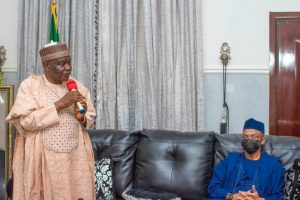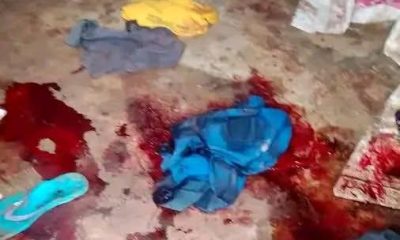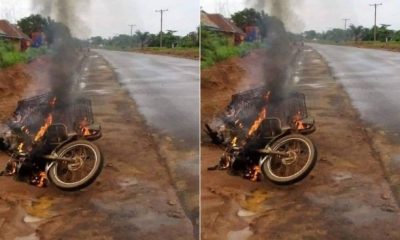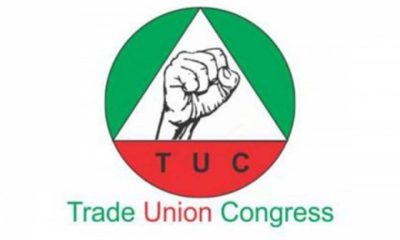NEWS
El-Rufai visits Plateau on condolence over attacks

Gov. Nasiru El’ Rufai of Kaduna State, has visited Plateau to commiserate with the government and its people, over loss of lives and property in recent attacks in the state.
El’Rufai’s condolence visit to Plateau is contained in a statement on Sunday by Mr Doman Wetkum, Chief Press Secretary to the Plateau Deputy Governor, Prof.
Sonni Tyoden.The Kaduna state governor at the visit, said that adherence to the rule of law, was critical to the survival and stability of every society.
He said that Kaduna state and Plateau, were not only neighbours, but constantly faced with similar violent experiences.
The governor assured that Kaduna state would collaborate with Plateau, through sharing ideas, that would help in tackling the spate of insecurity in both states.
El-Rufai noted the relentless efforts of Gov. Simon Lalong, toward the restoration of peace in Plateau, and prayed for the repose of the souls of the departed.
Responding on behalf of Lalong, Tyoden thanked El-Rufai for commiserating with Plateau people at its current trying times.
Tyoden decried current security situation in the state and across the nation, calling for concerted efforts to salvage the situation.(NAN)
Education
Varsity Don Advocates Establishment of National Bureau for Ethnic Relations, Inter-Group Unity

By David Torough, Abuja
A university scholar, Prof. Uji Wilfred of the Department of History and International Studies, Federal University of Lafia, has called on the Federal Government to establish a National Bureau for Ethnic Relations to strengthen inter-group unity and address the deep-seated ethnic tensions in Nigeria, particularly in the North Central region.
Prof.
Wilfred, in a paper drawing from years of research, argued that the six states of the North Central—Kwara, Niger, Kogi, Benue, Plateau, and Nasarawa share long-standing historical, cultural, and economic ties that have been eroded by arbitrary state boundaries and ethnic politics.According to him, pre-colonial North Central Nigeria was home to a rich mix of ethnic groups—including Nupe, Gwari, Gbagi, Eggon, Igala, Idoma, Jukun, Alago, Tiv, Birom, Tarok, Angas, among others, who coexisted through indigenous peace mechanisms.
These communities, he noted, were amalgamated by British colonial authorities under the Northern Region, first headquartered in Lokoja before being moved to Kaduna.
He stressed that state creation, which was intended to promote minority inclusion, has in some cases fueled exclusionary politics and ethnic tensions. “It is historically misleading,” Wilfred stated, “to regard certain ethnic nationalities as mere tenant settlers in states where they have deep indigenous roots.”
The don warned that such narratives have been exploited by political elites for land grabbing, ethnic cleansing, and violent conflicts, undermining security in the sub-region.
He likened Nigeria’s ethnic question to America’s historic “race question” and urged the adoption of structures similar to the Freedmen’s Bureau, which addressed racial inequality in post-emancipation America through affirmative action and equitable representation.
Wilfred acknowledged the recent creation of the North Central Development Commission by President Bola Tinubu as a step in the right direction, but said its mandate may not be sufficient to address ethnic relations.
He urged the federal government to either expand the commission’s role or create a dedicated Bureau for Ethnic Relations in all six geo-political zones to foster reconciliation, equality, and sustainable development.
Quoting African-American scholar W.E.B. Du Bois, Prof. Wilfred concluded that the challenge of Nigeria in the 21st century is fundamentally one of ethnic relations, which must be addressed with deliberate policies for unity and integration.
Foreign News
Madonna Urges Pope Leo to Visit Gaza

Pop icon Madonna has made an appeal to Pope Leo XIV, urging him to visit the blockaded Gaza Strip amid a starvation crisis that has sparked international outrage.
“You are the only one of us that cannot be denied entry,” the U.S. singer wrote on social media platform X late on Monday.
“We need the humanitarian gates to be fully opened to save these innocent children.
“There is no more time,” she added.
Marking the 25th birthday of her son Rocco Ritchie on Monday, Madonna also announced plans to donate to humanitarian organisations working in Gaza.
“I feel the best gift I can give to him as a Mother is to ask everyone to do what they can to help save the innocent children caught in the crossfire in Gaza,” she wrote.
A United Nations (UN) agency said late last week that “acute malnutrition among children in Gaza has reached the highest levels.”
In July alone, nearly 12,000 children lower than five in age were identified as acutely malnourished, with another 2,500 found to suffer from severe acute malnutrition.
According to the UN Office for the Coordination of Humanitarian Affairs (OCHA), this is the most life-threatening form.
Israel controls access roads to Gaza and has sealed off the coastal area.
Very little aid got into Gaza from March through May, when Israel began allowing in deliveries using a controversial private system that bypasses traditional UN agencies.
Under pressure from allies, Israel recently began permitting larger convoys into the territory, as aid airdrops take place overhead.
On Sunday, Irish rock band U2 issued a stinging critique of the Israeli government’s actions.
“We know Hamas are using starvation as a weapon in the war, but now so too is Israel and I feel revulsion for the moral failure,” frontman Bono wrote.
Foreign News
Putin Bans Foreign-made Clothing for Russian Army From 2026

Russian President Vladimir Putin signed a decree on Monday banning the procurement of foreign-made clothing and related gear for the country’s armed forces starting in 2026.
According to the decree, from Jan. 1, 2026, all uniforms and other clothing items for the Russian Armed Forces must be produced by Russian companies whose manufacturing facilities are located within the country.
By 2027, the requirement would extend to fabrics and knitted materials used in production, which must be domestically manufactured.
The measure aims to entirely exclude the purchase of foreign-made clothing and materials for the needs of the military, the decree said.
Military clothing and gear include uniforms, insignia, underwear, bedding, special clothing, footwear, equipment, and sanitary items.
Such supplies are procured through the Russian state defence order system.






























